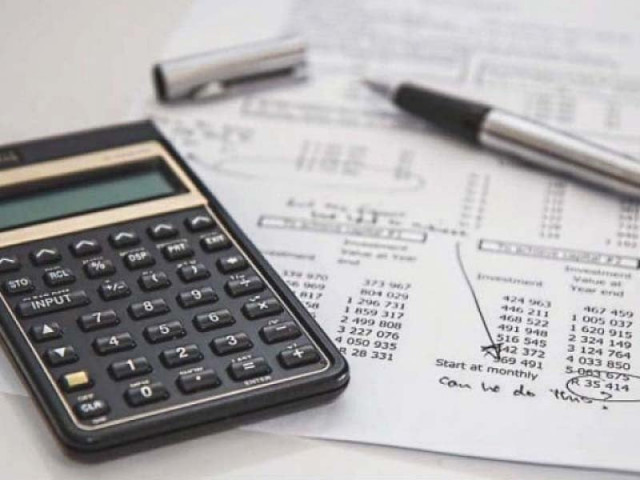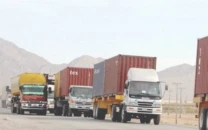PM turns down GST waiver proposal
Declines taking matter back to IMF; sends 18% GST waiver proposal for review

Prime Minister Shehbaz Sharif on Thursday blocked a proposal to waive the 18% sales tax on local supplies of commodities, raw materials, and machinery to registered exporters due to a possible reaction from the International Monetary Fund (IMF).
The premier sent the proposal back to a ministerial committee, which had recommended restoring the sales tax exemption under the Export Facilitation Scheme (EFS). The decision was taken during a meeting at the Prime Minister's House before PM Sharif's departure to Belarus.
A committee led by Planning Minister Ahsan Iqbal had recommended abolishing the 18% sales tax on local supplies for exportersintroduced in June last yearand reintroducing insurance guarantees, which had been replaced in February with bank guarantees.
According to an official communiqué, the prime minister directed the authorities concerned to provide a level playing field for local industries and incorporate the proposals of industrial and trade bodies into the upcoming federal budget.
There is a possibility that the government may impose an 18% sales tax on imports of these commodities to end the disparity, which is hurting local industries.
The tax, introduced in the budget, applies to local supplies of commodities, raw materials, and machinery to registered exporters. However, there is no such tax on imports of these goods, creating an anomaly being exploited by exporters who now prefer to import tax-free items rather than procure them locally.
As a result, dozens of ginning factories have suffered financial losses, prompting the PM to seek a resolution to the anomaly.
Two months ago, the government had also tightened conditions for availing the Export Facilitation Scheme (EFS) after manufacturers were found misusing a facility intended to boost exports. Among the key changes, the government replaced insurance guarantees for imported raw materials with bank guarantees, a move aimed at curbing misuse.
The government also reduced the utilisation period for imported raw materials from five years to nine months, with an additional three-month extension subject to committee approval. Manufacturers had been reselling imported raw materials in local markets and replacing them with domestic alternatives to evade taxes.
To avoid the 18% sales tax on local supplies under the scheme, manufacturers increasingly turned to raw material imports, which further strained Pakistan's foreign exchange reserves.
The committee led by Iqbal had recommended restoring the tax exemption, reintroducing insurance guarantees, and imposing taxes on the import of iron.
However, some participants in Thursday's meeting believed the IMF would not allow the waiver and advised the government against pursuing it. The IMF had previously taken a hard stance on the imposition of the 18% GST on local supplies. Despite announcing its reversal in his budget wind-up speech, the finance minister failed to implement the change.
At the time of the budget's unveiling, the finance minister proposed imposing the tax but later stated in his wind-up speech that the "zero-rating facility under the EFS scheme would not be abolished." Nonetheless, the tax remains in place nine months after that announcement.
Sources said that during the meeting, the finance minister offered to raise the issue again with the IMF but acknowledged the possibility that the Fund might not agree. The prime minister declined the proposal to take the matter back to the IMF.
The planning minister is expected to hold another meeting today (Friday) to develop consensus on resolving the anomaly in a manner that does not put local industries at a disadvantage compared to tax-free imports.
There is also a view that the government should at least extend the scheme to the iron and steel sector, arguing that the cost of the Federal Board of Revenue's (FBR) inefficiency should not be borne by the industries. The government had ended the scheme's benefits for the iron and steel sectors in February, assuming that it was enabling tax evasion.
The government had authorised the FBR to cross-check input-output ratios against factory production capacity. Additional controls such as vendor facilitation checks, sample withdrawals to verify the use of imported inputs in exported goods, and stricter monitoring mechanisms were also introduced to prevent misuse.
Launched in 2021, the scheme was designed for exporters, manufacturer-exporters, commercial exporters, indirect exporters, common export houses, vendors, and international toll manufacturers.
Users of the scheme were required to be vetted by the Collector of Customs and the Director General of the Input-Output Coefficient Organisation (IOCO). Inputs eligible under the scheme included raw materials, spare parts, components, equipment, and machineryall of which were exempt from duties and taxes. Local supplies of inputs to authorised users were also zero-rated.
Chairing the review meeting on the EFS, the PM said that increasing the country's exports to boost national revenue was among the government's priorities.
Some participants argued that exports cannot be substantially increased until the 18% GST on local supplies is removed. They claimed the tax has increased the cost of production for factories and caused serious refund-related issues.
The prime minister instructed further consultation with relevant experts on the committee's recommendations to improve the scheme for facilitating the import of raw materials and machinery for export-oriented industries. He directed the committee to finalise its interim recommendations after further consultations and present the report soon.



















COMMENTS
Comments are moderated and generally will be posted if they are on-topic and not abusive.
For more information, please see our Comments FAQ